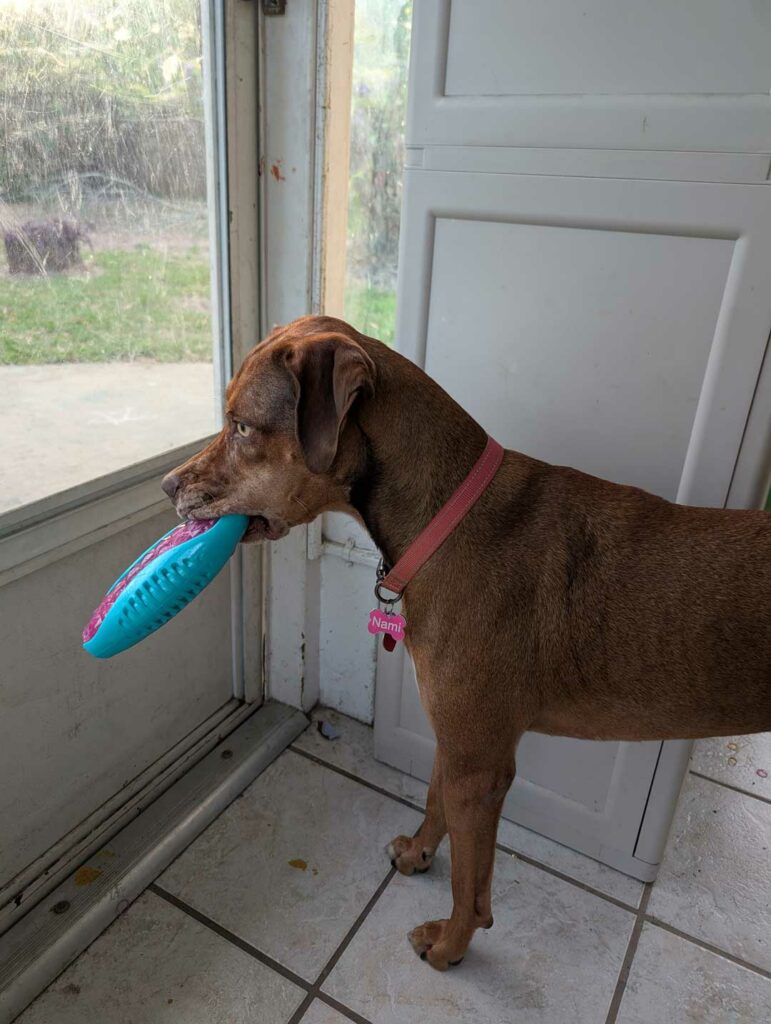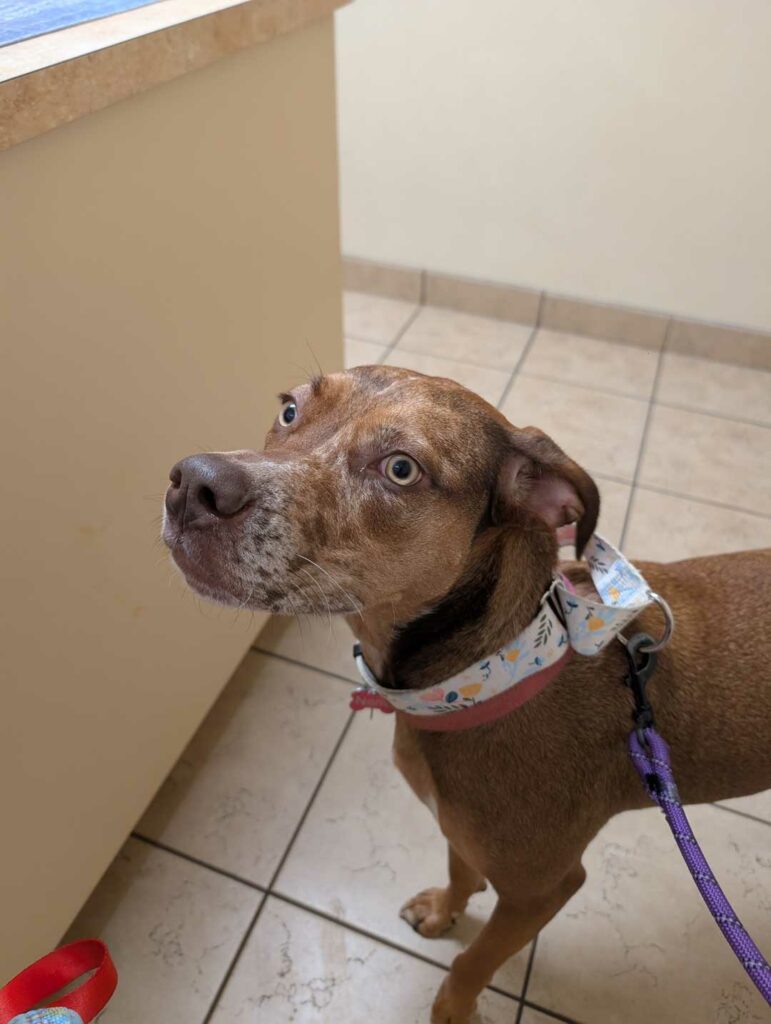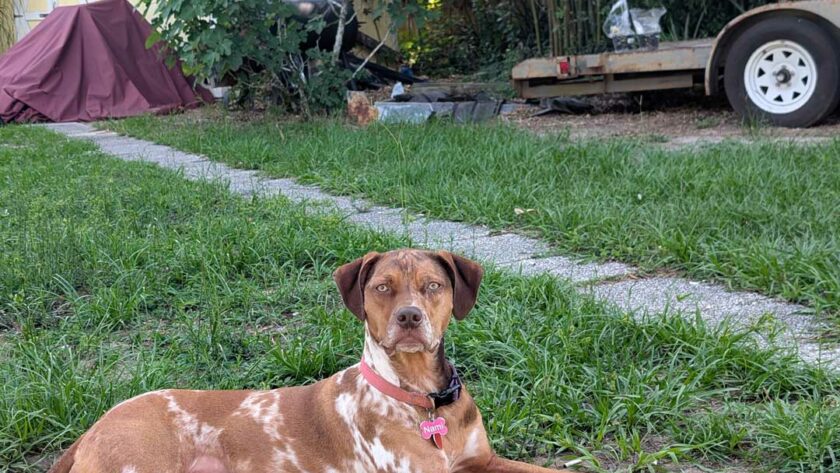Before you adopt a Catahoula, you need to know why these beautiful, bold dogs so often end up behind shelter walls.
You see those soulful eyes and stunning leopard spots, and you wonder—how could anyone give up a dog like that? Sadly, Catahoulas often fill shelter kennels across the country.
Adopt a Catahoula: What to Know Before You Rescue One
As a proud Catahoula mom, I’ve seen it firsthand. These dogs are amazing—but they’re not for everyone. Their drive, energy, and spirit need the right match. Otherwise, they’re too often surrendered. So, let’s break down why this keeps happening—and how you can make a difference when you adopt a Catahoula.
Why Do So Many Catahoulas End Up in Shelters?
Catahoulas are stunning, smart, and full of energy. But those same traits are often what land them in shelters. Too many people adopt a Catahoula without fully understanding what this breed really needs to thrive.
They’re working dogs—built for herding, hunting, and problem-solving. When they don’t get enough mental or physical stimulation, behavior issues show up fast. Chewing, escaping, digging, barking… it’s not bad behavior. It’s a bored, underworked dog trying to cope.
Unfortunately, the typical home doesn’t match a Catahoula’s lifestyle. Small yards, long workdays, and limited activity can quickly overwhelm even a well-meaning owner.
Many Catahoulas are surrendered because people didn’t research the breed before bringing one home. They fall in love with the coat, not the commitment. And when things get tough, the dog ends up at a shelter labeled “aggressive” or “too much.”
Here are a few of the most common reasons Catahoula rescue dogs end up back in the system:

- Lack of proper training or consistent leadership
- Not enough daily exercise or enrichment
- Strong herding instincts with no job to do
- High energy in a low-energy household
- Backyard breeders selling to unprepared owners
- First-time dog parents overwhelmed by the intensity
The truth? These dogs aren’t broken—they’re just misunderstood. With the right environment and guidance, they make fiercely loyal companions. But if you want to adopt a Catahoula, it’s critical to be realistic about what they need.
The Impact on Catahoulas (and Shelters)
It’s heartbreaking, but many Catahoulas get labeled as “unadoptable” after just one failed home. All because someone picked them for their spots, not their needs.
Too often, people adopt a Catahoula because of how striking they look. The leopard coat, the bright eyes—they’re gorgeous. But adopting based on looks instead of research sets both the dog and the family up to fail. And when things fall apart, it’s the dog who pays the price.
In shelters, Catahoulas don’t do well. They’re social, driven, and easily affected by stress. Without enough stimulation, they experience extreme dog boredom and mental regression. They pace, bark, or shut down completely.
Worse, shelters often lack staff who understand the breed. Catahoulas can seem reactive or intense—but with the right outlet, they thrive. In the wrong environment, though, they can spiral. And that’s when some are labeled aggressive or high-risk.
This lack of understanding leads to devastating consequences:
- Breed-specific euthanasia in areas with stricter restrictions
- Overcrowded rescues unable to meet the breed’s needs
- Dogs shuffled from shelter to shelter with no stability
- Missed opportunities for adoption due to stress-based behavior

Every time a Catahoula is returned or rejected, their confidence takes another hit. These dogs need structure, connection, and room to move. Without it, they become shells of the bold, loving companions they’re meant to be.
Before you adopt a Catahoula, know this: they don’t need pity—they need people who understand their spirit and are ready to meet them halfway.
How You Can Help
If you’ve made it this far, chances are your heart is in the right place. And good news—you can help change things for Catahoulas in need.
First, if you’re ready to open your home long-term, adopt a Catahoula from a reputable rescue. These organizations know the breed and work hard to match the right dog with the right person.
Not ready to commit? Fostering makes a huge impact. Even a short stay gives a Catahoula a break from the stress of shelter life—and helps rescues open space for another dog in need.
Volunteering your time matters too. Whether you walk dogs, help with transport, or lend your skills online, Catahoula-focused rescues always need support.
You can also be a voice for the breed. Tell people the truth about what Catahoulas need—especially those who may adopt based on looks alone. Education saves dogs.
Want to do something right now?

Here are a few easy ways to help:
- Talk to friends and family about the reality of owning a Catahoula
- Share Catahoula adoption posts on social media
- Donate to breed-specific rescues
- Leave positive reviews for responsible breeders
Finally, if you ever do choose to get a puppy, support ethical, informed breeders—not backyard breeders just trying to cash in. A good breeder cares about temperament, health, and where their dogs end up.
Every post, share, and conversation helps. And every time you choose to adopt a Catahoula or support those who do, you’re making a difference.
Where to Find a Catahoula to Adopt
If you’re ready to adopt a Catahoula, start here. These rescues specialize in the breed and work hard to place dogs in loving, informed homes. Whether you’re looking to adopt, foster, or support from afar, these organizations are doing life-changing work.
And speaking of adoption—let me share something personal. I adopted my sweet, chaotic girl from Williston Animal Group in Williston, Florida. While they aren’t a breed-specific rescue, they’re a phenomenal organization that truly cares about the animals they save. If you’re local to North Florida, I highly recommend checking them out.
Catahoula Rescue of New England
Serving the Northeastern U.S., this rescue focuses on saving Catahoulas from high-kill shelters and placing them in forever homes. They provide foster care, behavioral assessments, and breed education.
Blackjack Animal Rescue
Operating in the Southeast U.S., Blackjack focuses on Catahoulas and other at-risk breeds. They offer transport and work with adopters across several states.
Justice for Catahoula Leopard Dog Rescue (JCLDR)
JCLDR is a foster-based rescue with a mission to protect and rehome Catahoula Leopard Dogs. They also advocate for proper education and ethical ownership.
Rescue Me! – Florida Catahoula Listings
This site aggregates Catahoula rescue listings across Florida. It’s a great place to look for adoptable Catahoulas in need of a second chance near you.
Petfinder and Adopt-a-Pet
Search “Catahoula Leopard Dog” on Petfinder or Adopt-a-Pet to find breed-specific listings in your area. Filter by location, age, or rescue group to find your perfect match.
Final Thoughts: Changing the Story for Catahoulas
Catahoulas aren’t broken. They’re bold, brilliant, and fiercely loyal—but only in the right hands. When misunderstood, they struggle. When matched with the right home, they thrive.
To adopt a Catahoula is to accept a challenge—and a gift. It takes patience, energy, and a little bit of Catahoula chaos. But the love you get in return? It’s unmatched.
Every adoption success story starts with one person saying “yes.” Yes to learning the breed. Yes to sticking through the hard days. Yes to giving a dog the forever they deserve.

If you’ve walked this path, I’d love to hear your story. Drop a comment below and tell us about your Catahoula—whether you’re still in the chaos of puppyhood or years into your journey.
Thinking about adoption? Let me know your questions—this community is here to help!
FAQs About Adopting a Catahoula
Yes—if your family understands their needs. Catahoulas can be amazing with kids, but they need structure, training, and daily activity. They bond deeply with their people and thrive in homes that keep them physically and mentally engaged.
A lot! Most Catahoulas need at least 1–2 hours of exercise per day. Walks aren’t enough—they crave off-leash play, hiking, agility, and jobs that challenge them. Without this, they get bored fast and may develop behavior issues.
Not inherently. However, they are protective and may be wary of strangers. Proper training and early socialization are key. A well-adjusted Catahoula is loyal, alert, and confident—but not dangerous.
Maybe—but it depends on your lifestyle. If you’re highly active, work from home, and can meet their mental needs, it’s possible. However, most Catahoulas do best with a fenced yard and room to roam.
Do your research. These dogs aren’t couch potatoes—they need purpose. Be ready for training, activity, and commitment. If you’re up for the challenge, adopting a Catahoula can be one of the most rewarding things you’ll ever do.
